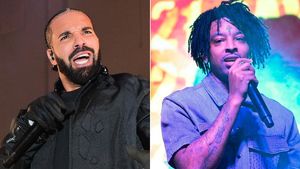The anticipation for the 2025 Grammy Awards has reached a fever pitch with the announcement of the nominees, stirring excitement and debate among music fans and industry insiders alike. This year's list is rife with talent, yet it shines a spotlight on the perennial point of contention: the definition of "Best New Artist."
Traditionally, the Best New Artist category has often sparked discussions about who qualifies as genuinely "new." This year is no exception. Among the nominees are artists like Sabrina Carpenter and Khruangbin, who, contrary to the category's title, have been making music for years. Carpenter, for example, released her first music over ten years ago and only recently received recognition for her work with the album, Short n’ Sweet. Khruangbin, known for their enchanting fusion of genres, has been captivating audiences since their debut album dropped in 2015. These artists are just the tip of the iceberg when it Comes to nominees who have long been on the music scene, raising eyebrows and sparking chatter about Grammy's guidelines and criteria.
The Grammy’s Best New Artist category has been historically perplexing. Artists like Alessia Cara and Chance the Rapper have received nominations long after their first breakthrough occurred, leading to perplexed fans questioning how one defines "new." According to Grammy CEO Harvey Mason, Jr., the award should be seen less as "Best New Artist" and more as recognizing those artists who have achieved significant national or international prominence during the eligibility period, which can include their first or sixth album. “It could be their first record; it could be their sixth record,” Mason noted. “What it really gets down to is when they rise to national prominence,” he continued.
Among the latest nominees, RAYE merits attention. Having begun her music career with EPs since 2014, RAYE released her debut mini-album, Euphoric Sad Songs, just last year, marking her real breakthrough. Similarly, Teddy Swims, whose debut album dropped right before the 2025 Grammy eligibility period, also shines with talent. Artists like Doechii and Benson Boone, who have been steadily building their careers since 2019 and 2021, respectively, have also made it onto the nominee list. Each of these musicians brings their unique flair to the table, maintaining their presence noticeable enough to warrant Grammy recognition, albeit under the somewhat misleading title of "new."
This year, even the once-emerging superstar Chappell Roan, who has seen her star rise faster than most, experiences the conundrum of the Best New Artist label. Her album, released barely a year ago, has propelled her to new heights, but she began charting singles back as early as 2020—well before the eligibility period for this year’s Grammys. The same pattern can be identified across the nominee lists, as virtually none of the nominees launched their music careers during the eligibility timeframe but are instead recognized for their recent achievements.
While some critics argue the category's setup shortchanges genuinely new artists seeking mainstream recognition, Mason defends the choice to honor the artists making significant strides over the past year. He states, “It’s challenging because it’s amorphous how you would evaluate Best New Artist. It is not an easy calculus to decide which artist fits the criteria.” With this reasoning, it follows naturally to question the intent behind the category, sparking discussions on its potential rebranding.
This bestows upon nominees like Carpenter and Khruangbin, who have substantial bodies of work but are only now gaining mainstream notoriety, the title of Best New Artist, even though they have been honing their craft for over a decade. This situation simultaneously reflects industry shifts as newer artists jockey for visibility and recognition among seasoned performers. Perhaps this recognition is exactly what has paved the way for them to rise to new heights. On the flip side, it has led to speculation about the legitimacy of the term “new” when used to categorize artists at the awards.
Meanwhile, country music nominees for the Grammy Awards this year have sparked their own controversies, often spotlighting the cultural shift manifesting within the genre. Past nominees such as Beyoncé and Post Malone have stretched the traditional country boundaries with their recent works, leading to polarized conversations about what qualifies as country music. Insightfully noting the increasing crossover of pop performers joining the country scene, music critics have been vocal about concerns surrounding the genre's identity. “When pop stars move to the country space, it creates issues,” said one music industry commentator. This blend has brought attractions to the genre like never before, yet questions are rising about whether the essence of country music is being overshadowed.
The nominations also highlight names like Kacey Musgraves and Lainey Wilson claiming their recognition this season. Musgraves’ Deeper Well and Wilson’s Whirlwind are both nominated alongside tracks from rising stars. Their placement within the country category has been characterized as showcasing the genre's evolution without diluting its classic sound.
To broaden the conversation, this year reveals the records underlining the rich diversity within country music, particularly with the nominations for artists like Shaboozey, who is recognized for the track “A Bar Song (Tipsy).” Shaboozey’s nomination attests to the transformative nature blending hip-hop and country, raising eyebrows within musical circles questioning whether such crossovers weaken distinctions between genres. This sentiment reverberated across social media platforms, as fans reacted to what they see as pop stars dominating country nominations and overlooking established country artists.
Still, the blending of genres has its perks, leading to discussions about the new directions country music is headed. “Pop is moving to country, and the sound is changing,” said one industry analyst, asserting the importance of adapting to survive the music industry. Often, the shifts offer opportunities for creative growth. For many artists breaking boundaries invariably leads to creative collaborations, which have flourished across the categories, showing how genre distinction can yield positive outcomes.
But as musical classifications evolve, traditionalists within country music are holding steadfast, yearning for authenticity rooted within the genre. For them, it is pivotal to reflect banners highlighting homegrown artists who cement their roots within the musical community. "Everywhere you turn, pop is going country," lamented another country music listener, expressing grave concern for the dilution of country representation at the Grammys.
This duality within award nominations paints complex narratives: on one hand, there’s burgeoning excitement and cross-genre exploration opening pathways for every artist. On the other, the backdrop looms of potential loss of authenticity as genres mingle, leaving country purists at odds with the mainstream entry of pop royalty claiming their musical heritage.
Aside from pop and country, the classical music nominations have also generated significant buzz. Nominees featuring the likes of Marin Alsop conducting the ORF Vienna Radio Symphony Orchestra raise expectations for the tradition-laden classical categories, showcasing the nuances of classical composers melding contemporary trends with classic elements. Performers like JoAnn Falletta with the Buffalo Philharmonic Orchestra and Gustavo Dudamel conducting the Los Angeles Philharmonic have brought fresh interpretations eleving the genres, challenging aged perceptions of classical music. This year’s recognition serves as reminders of the breadth encapsulated within the classical sphere and how developments are radically enhancing its prospects.
The 2025 Grammy Awards, scheduled for February 2nd, promises to be a momentous occasion where such discussions will take center stage. With numerous performers deserving recognition, the nominations reflect not just individual achievements but showcase complex intersections of genres and artistic identity.
What remains clear is the need for award-giving bodies like the Grammys to continually evaluate and reassess the frameworks around nominations and categories to encapsulate the diversifying musical culture of today.
Like any other year, the upcoming Grammy ceremony will not only serve to honor art but will also illuminate the discussions surrounding the evolution of music and the identities of those who perform it. Regardless of individual victories or losses, fans will continue to engage passionately, questioning and contemplating the relevance and construction of awards, forever intertwining the music they adore with their broader cultural identities.



